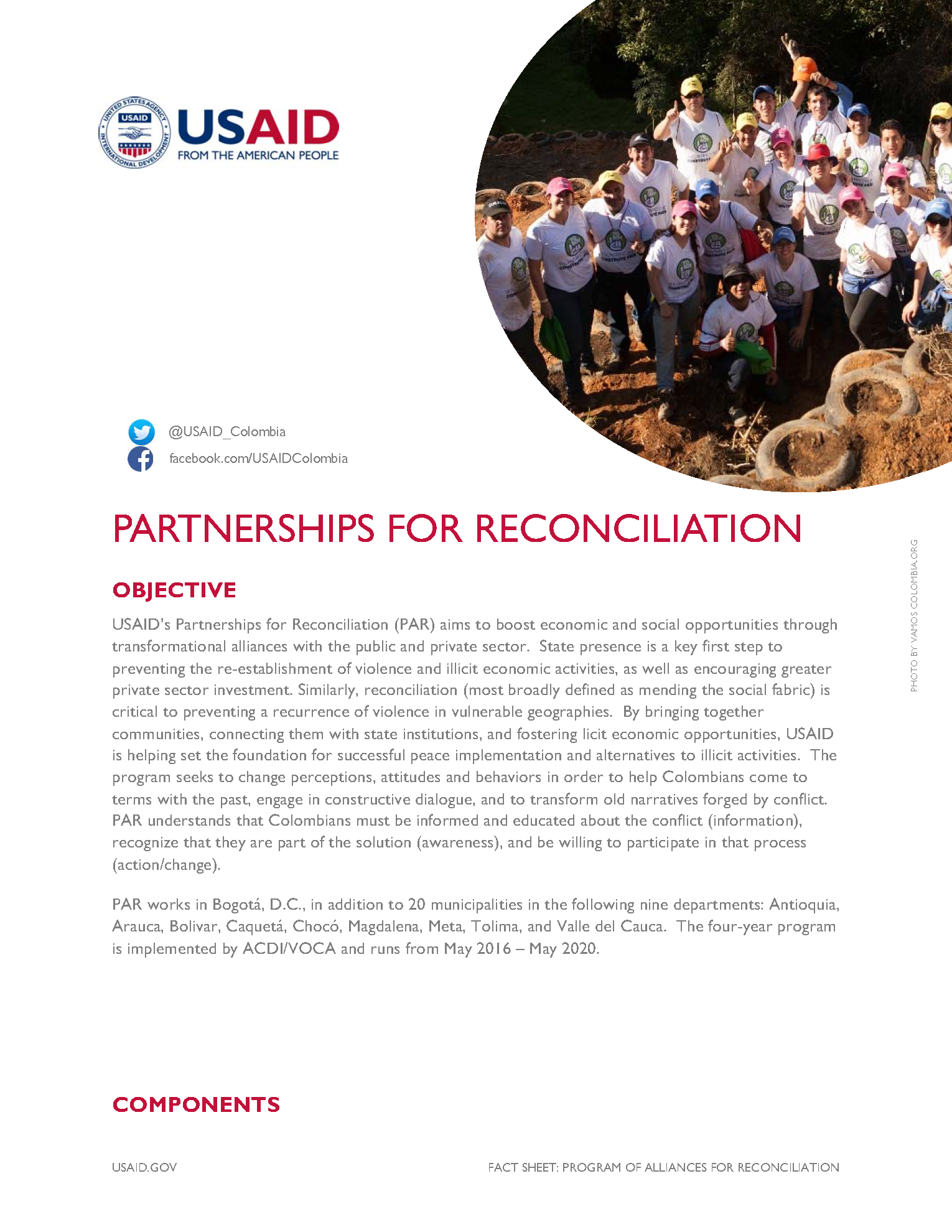RIO - Partnerships for Reconciliation (PAR) ![]() (pdf - 126k)
(pdf - 126k)
OBJECTIVE
USAID’s Partnerships for Reconciliation (PAR) aims to boost economic and social opportunities through transformational alliances with the public and private sector. State presence is a key first step to preventing the re-establishment of violence and illicit economic activities, as well as encouraging greater private sector investment. Similarly, reconciliation (most broadly defined as mending the social fabric) is critical to preventing a recurrence of violence in vulnerable geographies. By bringing together communities, connecting them with state institutions, and fostering licit economic opportunities, USAID is helping set the foundation for successful peace implementation and alternatives to illicit activities. The program seeks to change perceptions, attitudes and behaviors in order to help Colombians come to terms with the past, engage in constructive dialogue, and to transform old narratives forged by conflict. PAR understands that Colombians must be informed and educated about the conflict (information), recognize that they are part of the solution (awareness), and be willing to participate in that process (action/change).
PAR works in Bogotá, D.C., in addition to 20 municipalities in the following nine departments: Antioquia, Arauca, Bolivar, Caquetá, Chocó, Magdalena, Meta, Tolima, and Valle del Cauca. The four-year program is implemented by ACDI/VOCA and runs from May 2016 – May 2020.
COMPONENTS
Strategic Alliances
PAR utilizes public-private partnerships to foster socio-economic opportunities in 20 target municipalities, utilizing a reconciliation approach. The program’s primary private sector partners include Pontificia Universidad Javeriana, Reconciliación Colombia, Fundación Andi, and Semana Rural.
Truth Telling
Truth telling and memory efforts collectively enable Colombians to better address the past in order to rebuild their lives going forward. PAR will provide technical assistance, international best practices, and information dissemination strategies to help establish the Truth Commission, an institution created in the peace accords that will collect, document, and disseminate the consequences of the conflict. PAR also provides technical assistance, and communications and outreach strategies to the Center for Historical Memory to broaden its geographic coverage, and strengthen national and local memory and truth-telling initiatives.
Awareness Initiatives
Taking action starts with greater awareness. At the grassroots level, PAR addresses community-identified priorities in order to promote reconciliation and mend the social fabric. PAR also helps to increase public awareness on issues critical to reconciliation through stakeholder-driven campaigns promoting citizen engagement, private sector participation, and opportunities for moving beyond conflict.
Psychosocial support and a tailored approach for vulnerable populations are central elements of these three components.
EXPECTED RESULTS
- Establishment of 350 transformational alliances
- Investment of $88 million ($55 million in USAID funds, $33 million in leveraged funds)
- Generation of 6,500 jobs
- Investment of 250 companies in achieving USAID’s objectives
- Increase income for 10,000 families by 20 percent in the 20 target municipalities
- Implementation of the Reconciliation Barometer to monitor PAR’s impact








Comment
Make a general inquiry or suggest an improvement.